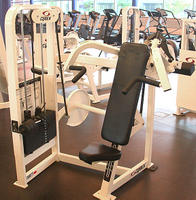 Anyone that knows me would describe me as, well, frugal. I do not own fancy cars, expensive golf clubs or big screen TV's. When it comes to things that are basic needs, "good enough" is my favorite slogan.
Anyone that knows me would describe me as, well, frugal. I do not own fancy cars, expensive golf clubs or big screen TV's. When it comes to things that are basic needs, "good enough" is my favorite slogan.However, the equipment you use in your fitness program should be as top notch as you can afford. Think if it as a literal extension of your own body. The better the quality equipment you have translates into better, and safer, results.
I am not saying that you should become a slave to certain brands or clever marketing campaigns. I would never pay $200 for a pair of shoes just because they are associated with a certain athlete's face or a cool slogan. However, I do want shoes that are worth $200. The key is to do your homework and ask experts for their professional opinion. Here are some tips:
Shoes. These are extensions of your feet, and if you use them in exercise repetitively, they can be an enormous liability and chief contributor to injury if they are sub-standard. There are shoes for pronators and supinators. There are shoes for those with high arches as well as flat feet. You are probably not an expert at this, so do not guess. Use publications like Runners World to do your research and ask people in the know. For example, I was playing rugby with soccer shoes for a number of weeks since I no longer owned rugby boots. After a few practices, my feet looked like hamburger. Soccer shoes are soft and not designed for the cutting and pounding of rugby. I learned my lesson the painful way, and then I limped out and bought great rugby boots.
Treadmills. Go cheap here, and you will regret it. Running is a punishing sport when you use poor equipment. Those $300 treadmills you get at Sears may be a "great" deal, but they are usually junk. They lack cushion on the track bed, have low power, are unstable and break down easily. Go to your local health club, see what brands they use and then search for the home model of that brand. You can also pick up commercial models on EBay or from clubs that are going out of business or upgrading their equipment. If you can afford a commercial model, buy it. It will probably last forever with only home use.
Weight Training Stations/Machines. When you are pushing heavy weights over your head, the last thing you want is instability. There is a reason that some machines are more expensive than others--they are made better. In general, the machine should be heavy and made of a steel frame. There should be little to no play in the levers or cables at rest. Also, beware machines that can supposedly "do it all." There is usually a weak spot such as a wobbly leg extension or flimsy pec dec add-ons. Test all machines thoroughly and do your homework. Consumer Reports is a good guide for unbiased reviews.
Miscellaneous Gear. Gloves, belts, heart monitors, wraps and other items all should be top quality as well. They will last longer and help your program be more successful. All of these products should feel like a natural part of your body and be almost unnoticeable when you are using them. As a general rule of thumb, if you can "feel" them when you are working out, you probably need to upgrade.
You might have noticed that I did not recommend any specific equipment or brands. This is because I do not have any illusions about being an expert on any of them. But, there are plenty of experts out there. Whether this is a successful athlete or an experienced sales person at your favorite sporting goods store, you should listen to their input if they seem sincerely concerned with your performance. Model the habits of those who succeed, and you will have a higher probability of success.
Incidentally, this applies to business development as well. Don't buy cheap suits--people notice. Don't skimp on technology--it is unreliable. And, pardon my French, don't engage in half-ass business development activities--you will get half-ass results!


No comments:
Post a Comment